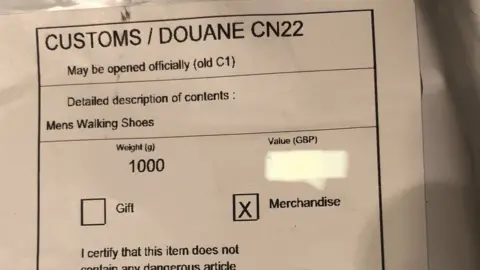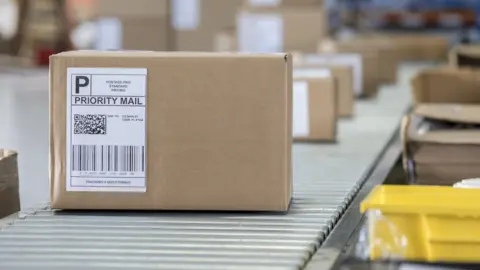Brexit: GB package to NI had international customs label
 BBC
BBCI experienced a small Brexit first this week.
A package delivered from a company in England arrived at my house in Belfast with a customs label attached.
The Post Office explains the purpose of the CN22 label saying that "CN22 are customs forms, used when sending goods internationally."
So, as far as one courier firm is concerned, sending parcels from one bit of the UK to another is now an international transaction.
The label also said: "Customs officials can open the item if they need to inspect the contents."
Strictly speaking, there was no need for the customs label.
Grace period
In December, the UK government announced a grace period for parcels meaning no new processes are required for most GB-NI parcel transactions until at least April.
But that announcement came just hours before the Brexit transition period ended.
By that stage, some GB companies and their delivery firms had already taken the decision that they would be using customs processes for their NI parcels.
That is understandable given that Northern Ireland is still enforcing EU customs rules at its ports, due to its special post-Brexit deal known as the Protocol.
Apart from taking much longer to arrive than usual, I had no hassle with my parcel.
But for many small businesses in Northern Ireland, the last two weeks have been nothing but hassle.
"Still waiting on pallet of oat milk from England - 10 days & counting," tweeted Belfast coffee shop owner Orla Smyth.
"Our whole food supplier in Glasgow can't deliver at all until they sort haulage issues."
This is typical of the problems facing independent food businesses in Northern Ireland - though a problem which will hopefully be eased next week.
Complex issue
The central issue has been the type of haulage known as groupage.
This is when goods from different suppliers for different customers are grouped together on one lorry.
It's commonly used by small businesses in NI who only need to bring in a pallet load of goods from GB rather than a trailer full.
This has now become a much more complex transaction, particularly for food products.
NI is still part of the EU single market for goods and so EU food safety processes apply on food arriving from GB, with certificates required for all products of animal origin.
 Getty Images
Getty ImagesA groupage movement could involve picking up food products from several different warehouses with loads potentially moving from one lorry to another along the way.
This means trailer seals having to be broken, goods being certified and re-certified with seals reapplied multiple times.
This is proving complex, time consuming and prone to error.
Therefore, many hauliers have been refusing to transport groupage food loads.
Talks involving industry representatives and senior officials at the Departments of Agriculture in Belfast and London took place last week to thrash out a solution.
That will involve individual pallets being sealed by methods such as being wrapped in plastic with the lorry trailer only being sealed when the final pallet is loaded.
Tariffs on steel?
Some operators are confident it will allow them to restart deliveries next week.
But this is just one issue which needs an urgent fix.
Also on the agenda is the possibility that steel imports to NI could be clobbered with a 25% tariff.
On top of that, there is the cumbersome processes for moving organic food products from GB-NI.
Some senior DUP figures are insisting that all this shows that the Protocol is unworkable in its present form.
They're calling on the UK government to use Article 16 of the Protocol which would allow some of the Irish Sea border processes to be temporarily dropped.
So far the government has given no indication that it's seriously considering that, describing the problems as "teething troubles" which can be solved.
